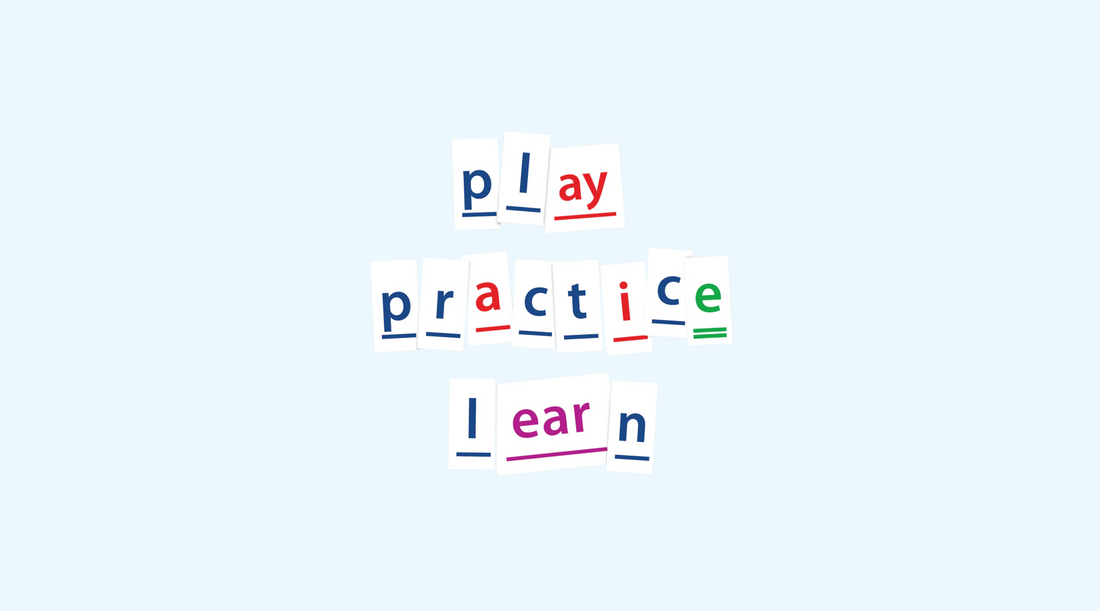Fun Ways to Build Literacy Skills During the Winter

By Amanda
As the weather gets colder in most parts of the country, it's time to cozy up with a cup of hot cocoa and think of ways to engage learners during winter. We are sharing ideas for reviewing literacy skills in a fun, wintery fashion. Next, consider how students can practically apply reading and writing during the winter. Finally, we have some suggested gift ideas for children who enjoy reading and learning!
Winter Review Activities
There is a sense of excitement on crisp mornings, starting the fire and kids playing outside in the snow. This is the perfect time to engage students with the season's sights, sounds and textures, providing the perfect opportunity to review skills taught during the year in a fun and festive way!
Indoor Winter Activities
Phonogram/Spelling Collage
Collect store or grocery advertisements to practice spelling and phonogram skills creatively. Students cut out items for a family meal and use spelling analysis skills to write a grocery list. Glue the picture of the item on one side of the paper and spell the word next to it. Use the Spelling Analysis process to guide students in examining each word.
Phonogram Coloring Books
Finding a cozy spot and coloring can be a wonderful way to relax and unwind. Try using one of our Doodling Dragon’s Coloring Books to help you feel calm while reviewing phonogram sounds. For an added bonus, play our Phonogram Songs while you color!
Winter-Themed Sensory Box
Fill a plastic container with winter-themed materials, such as rice; white beans; pom-poms in colors like white, blue, red, and green; or cotton balls. Then, add objects that help review the spelling and phonogram skills that have been taught. Have students locate the items and use phonogram game cards to match the spelled words. For added fun, encourage learners to use spelling analysis, write the words on their whiteboards or spell with phonogram game tiles.
|
Phonogram Game Cards (outside the box) |
Object |
|
p |
penguin |
|
wh |
whale |
|
i |
igloo |
|
f |
fox |
|
s |
seal |
Outdoor Winter Games
It’s time to put a winter spin on some of our favorite Logic of English Game Book games.
Marco Polo Word Game
To play the Marco Polo Word Game, follow these steps:
-
Choose Words: Select 10 to 15 words for practice and write them in dark colors on index cards.
-
Find a Safe Location: Choose a safe place outside in the snow to play the game.
-
Choose someone to be “it.” Have one student close their eyes to become "it." The child who is "it" will say "Marco" while holding up a word card.
-
Read the Word: A parent or another child can hold the card. The other children must read the word card out loud.
-
Playing the Game: Each time the child who is "it" says "Marco," they should hold up a new word card. This continues until the child who is "it" tags another child. That new child will then take their turn as "it.”
Remember to bundle up and stay warm while playing! (version adapted from page 130)
Phonogram Treasure Hunt (Winter Version)
To play this game, follow these steps:
-
Winterize Phonogram Game Cards: Laminate or place phonogram game cards in small snack-size reclosable plastic bags. You can also write phonograms on flash cards if you don’t mind them getting wet in the snow.
-
Teams: Divide kids into two groups. One team covers their eyes while the other hides the phonogram cards around a designated area outside. Hide enough cards so each child can find 5-10. Consider a safe area with a snow maze, playground, or fun winter fixture.
-
Treasure Chest: Locate or create a treasure chest that holds the phonogram cards once they are found.
-
How to Play: The first team opens their eyes and searches for the phonogram treasures. When a student finds a phonogram, the player must bring it to the adult and read it. Then write it on a whiteboard (or in the snow). The adult checks for accuracy; if correct. The phonogram can be placed in the treasure chest. If incorrectly read or written, have the student hide the card again for someone else to find. When all phonograms are found, the teams switch roles and play again.
Another reminder to bundle up; it’s cold out there! (version adapted from page 45)
Real-World Learning
Sometimes, the best way to practice concepts children learn is to use those skills in real-world applications. A new season offers many low-prep opportunities and can be very rewarding. Consider doing one or several of the following with your students.
Cooking and Baking
Recipes are considered functional texts, guiding one in completing actions or tasks. When a child follows a recipe to prepare a family meal or bake cookies, they engage in numerous literacy skills. They decode words, follow directions, understand vocabulary and utilize comprehension skills. Along with literacy, students practice math and science concepts through the process.
Giving Back to the Community
As we reflect on what we are thankful for, it is a great time of year to give back to those we appreciate or others in need. It’s also a great time of year to give back to those we appreciate or others in need. A wonderful way to express gratitude to those in uniform, such as military personnel and first responders, is by coloring and writing cards or letters to them for their sacrifices. Also, many retirement homes gladly accept cards and letters for their residents, especially since some may not have a family to visit. This is a wonderful way for children to practice their spelling and handwriting skills while bringing joy to someone’s day!
Winter Reading Challenge
Visiting your local library or thrift store can unlock a wonderland of themed reading opportunities! This is a fantastic way to involve your children in books celebrating the season. Here are a few ideas to get you started:
- Books about winter holidays
- Books about winter animals
- Books about winter weather
- Books about new hobbies
- Books that were made into a movie
- Books focusing on thankfulness, helping others, and family
- Books featuring a Doodling Dragon, a Whistling Whale, or a Knitting Knight
- Consider revisiting a favorite book
Gift Ideas for Kids Who Love Learning
Books are a great gift for any holiday or occasion. If you have a child who loves to read, write and learn, we have some suggestions to help nurture their passion for learning.
Book Series
A captivating series of books may entice young readers with an interesting main character and plot that keeps them yearning for more.
Personalized Books
Who doesn’t love seeing their own name in a story? Several companies offer personalized books that add a special touch to reading.
Book Subscription Sets
Consider a subscription service that delivers a monthly book surprise throughout the year. This can provide variety in genre and topic for children to explore.
Crafts and Hobby Sets
Whether it’s learning how to sew, knit, build, or perform science experiments, learning a new hobby can be a rewarding experience.
Brain Teasers
Puzzles, word searches, crossword puzzles, and sudoku can offer a challenge while supporting critical thinking skills.
Involving children in reflecting on and reviewing what they have learned can be an exciting experience. This is an opportunity to inspire meaningful goals focused on reading, writing, and learning. When we demonstrate how enjoyable and valuable learning can be in everyday life, we pass this enthusiasm on to future generations.

